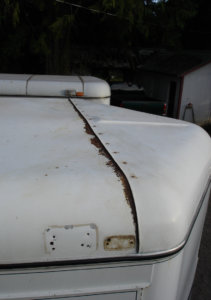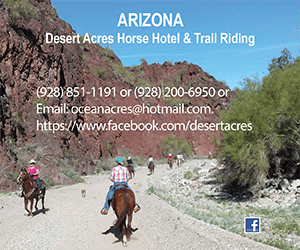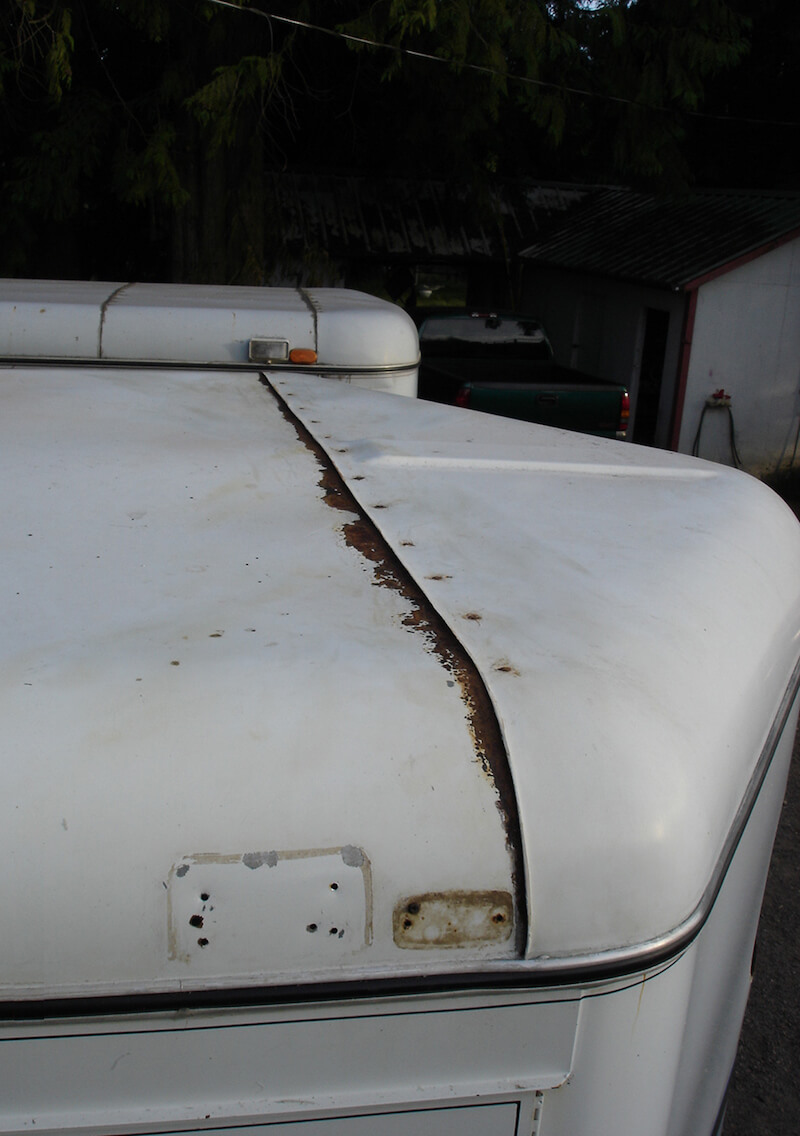Trailer Roofs, Windows, and Vents
by Leigh Goodison Grieve
Most horse trailers, aluminum, steel or fiberglass, will eventually leak no matter how well you maintain them or keep them under cover. Aluminum flexes more than steel, which can put stress on seams. If aluminum trailers are acid washed, the acid eats away the caulking and allows water to get in.
Ways to prevent leaks:
- Never walk on the roof or place anything on it without the roof framework first being structurally prepared for such weight
- Make sure there is no rust between roof seams and the caulking is not dried out or missing
- Make sure vents are closed during bad weather, that they fit properly and caulking is in good shape
- Check for missing rivets, cracks or holes by placing a bright light on the inside of the trailer at night, then go outside to see where light is shining through.

When the caulking deteriorates on a steel trailer, dirt and water get trapped in between the seams. If the trailer is stored under trees or in a dark area, moss may grow, which in turn holds more water. Once the seams begin to rust, any rust, old caulking, flaking paint or moss must be completely removed and the steel treated with a rust inhibitor before reapplying caulking. Old caulking on aluminum trailers also needs to be removed and the surfaces properly prepared before applying new.
If you are getting leaks from around the vents it may be that the seals have dried out or deteriorated. Or the vents may be so rusted they don’t shut properly and need to be replaced completely. Never travel with your vents open forward as this not only forces water into the stall area, it also creates wind noise that may upset the horses. When vents are open facing to the rear, the hot air generated by the horse’s body is able to escape.
Deteriorated window seals, misaligned windows or open sided stock trailers will let moisture in. Removable Plexiglas sliders can be custom fitted into stock trailers but these are by no means waterproof. They will also reduce the amount of ventilation in the trailer if there are no roof vents, so take into consideration the extra heat generated by horses.
Fiberglass roofs are not immune to the elements. A good quality fiberglass conditioner should be applied frequently or on an as-needed basis after cleaning thoroughly. Fractures or spider’s web type cracks should be treated and/or filled before applying the conditioner. You may need multiple coats to restore the condition of the fiberglass. If it becomes too brittle it will eventually fracture and replacement may be extremely expensive if not impossible with an older trailer.
If you have a steel roof that has become too dented and misshapen to create a good seal with caulking, it may be necessary to apply a rubberized membrane coating such as a snow-roof on a house. This essentially seals off any exterior moisture. But again, before applying any exterior coating, the surface needs to be impeccably clean, all rust and old caulking removed, and a rust-inhibiting primer applied.
If you can’t keep your trailer under cover, you should invest in a trailer cover such as those manufactured by Beverly Bay (www.beverlybay.com). Although these can be cumbersome to put on, there are tricks to make it easier. Roll the cover up like a sleeping bag. Then place a sturdy stepladder at the rear of the trailer and have a helper hand you the rolled up cover. Place it on the trailer roof and unfurl it so that it rolls toward the front of the trailer. You will then be able to drop down the front and sides of the cover until the trailer is covered, then secure the ties.
If you can’t afford a cover, a tarp tied down securely will help keep the water off your roof and from getting inside. Just remember to check occasionally for tears in the tarp, and condensation or mildew that might be forming underneath. Whenever your trailer is covered, or not being used, it’s always a good idea to have a portable dehumidifier such as the Eva-Dry 500 or the similar Remington unit, to help reduce moisture inside. Do not use ‘disposable’ dehumidifiers because it’s too easy to forget to replace or empty them and when they dry out, the dissipating chemicals coat the inside of the trailer and your tack with acidic residue that can cause corrosion.
Leigh Goodison Grieve is a freelance writer and editor, whose work has appeared in Western Horseman and Northwest Family Magazine among others. She and partner David Bodin will be presenting seminars on horse trailer safety and maintenance throughout WA and OR. For dates and locations visit www.handyrider.com* or email [email protected] “The Secret Lives of Horse Trailers” will be available on DVD this fall.
*This link was no longer active at the time this article was added to the website in 2018.
Published December 2011 Issue

The Northwest Horse Source is an independently owned and operated print and online magazine for horse owners and enthusiasts of all breeds and disciplines in the Pacific Northwest. Our contemporary editorial columns are predominantly written by experts in the region, covering the care, training, keeping and enjoyment of horses, with an eye to the specific concerns in our region.






